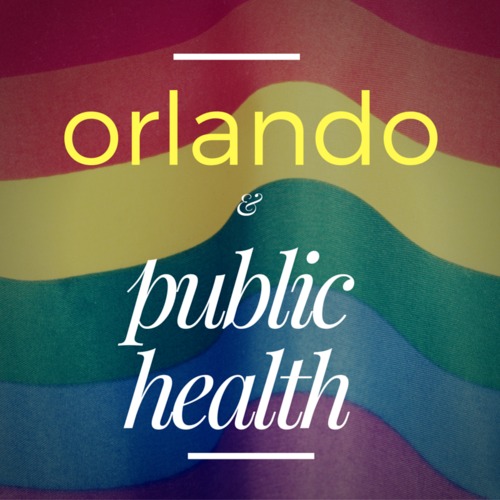Frontline Blog
Reflecting on the Tragedy in Orlando Through a Public Health Lens
June 2016
By Chrissie Juliano, MPP, Director of The Big Cities Health Coalition

Only days ago, our nation experienced another mass shooting, the largest and most deadly to date. Forty-nine innocent, young people were murdered in a nightclub in Orlando, where they came together simply to hang out and dance. We as a nation experience these violent events far too often, and today, our Coalition stands in solidarity with the LGBTQ community, at whom this attack was directed; with the victims and their families of this latest event; and with all Americans who experience the trauma of gun violence each and every day. We stand committed to them no matter their race, ethnicity, religion, sexual orientation, gender identity, or place of birth. This is a time for our nation to come together to mourn the loss, find solutions, and discourage bigotry and hatred in all its forms.
Members of the Big Cities Health Coalition, comprised of public health leaders from 28 of the nation’s largest, most urban areas, know that public health science and expertise have a valuable role to play in finding common ground, bringing forward evidence-based solutions, and, at the end of the day, ensuring that fewer people are hurt or killed by gun violence. Promoting prevention, ensuring equity, and enabling Americans to live healthier lives in safe, prosperous communities, are the central tenets of what we in public health do every day.
The most essential thing we know as public health experts is that violence is, in fact, preventable. And when violence is viewed as a public health problem, and is researched and addressed through that lens, lives can be saved. For nearly twenty years, Congress has in effect banned the U.S. Centers for Disease Control and Prevention from using their funds to research gun violence. This needs to change.

As our nation reflects on Orlando, the most meaningful way to honor those lost is to take action to try and stop this sort of tragedy from happening again. Our elected officials at the national level need to take common sense actions, like banning the civilian purchase of assault weapons and high-capacity magazines of ammunition. We also need to thoroughly vet those who purchase firearms in the first place. An analysis by the Southern Poverty Law Center found that of the 63 terrorist incidents on American soil between 2009 and 2015, nearly two-thirds (64 percent) were perpetrated with firearms. This is why we need to not only close the “gun show” loophole, so that firearms can only be purchased legally by those who undergo a background check, but also make it less likely that guns are sold to high-risk individuals, such as suspected terrorists on the “no fly” list or those convicted of violent crimes.
Despite stagnation at the federal level, cities and states have been diligently working to address these issues. Our members know well the patterns of gun violence and the toll it takes, because this problem disproportionately affects the populations they serve. Indeed, violence is one of the most familiar and challenging public health problems our cities face. Between 1968 and 2011, more Americans have died due to gun violence than in all the wars this country has fought. Youth violence is the leading cause of injury and death for young people aged 10-24 years old, and in many of the country’s largest cities, homicides and violent crime rose significantly in 2015. Data from the National Crime Victimization Survey indicates that between 2010 and 2014, there were an estimated 43,000 hate crimes committed in the United States that involved guns. Meanwhile, the Attorney General’s National Task Force on Children Exposed to Violence reports that 46 million of the nation’s 76 million children – roughly 60 percent – are exposed each year to violence, crime and abuse. The result: the nation pays a high price in lives, money and in lost potential.
There is much more to be done to achieve a less violent America. As with any other problem that affects health and well being, it is best to begin the search for solutions by examining what we know works.
Traditionally, many have looked solely to law enforcement-driven policies to stem violence, but in recent years, more and more cities have found success by taking a public health approach that complements that of law enforcement. This includes using analytics and data, prevention tactics, and working to address the social determinants of health. Boston, Kansas City and Minneapolis, are among those taking innovative approaches, and are starting to see significant progress in reducing and preventing violence in their communities.
The massacre in Orlando was tragic and historic, but sadly not as rare as it should be. It underscores the fact that violence in America disproportionately affects certain groups of people, such as the LGBTQ community and communities of color. This pattern directly contradicts our Coalition’s vision of true health equity, where everyone feels safe from violence or the threat of violence, regardless of race, age, religion, place of birth, gender identity, or sexual orientation. This tragedy must result in a renewal of our collective commitment not only to prevent violence, but to create the conditions through which we are all able to live healthier, safer lives. This includes implementing a host of prevention activities, as well as policies that reflect sound, evidence-based research.
If one community is suffering from violence, we all must play a role in mitigating its damage and preventing future events. Today, our hearts are with those in Orlando, and our heads are focused on how we can prevent this scale of violence from ever occurring again.